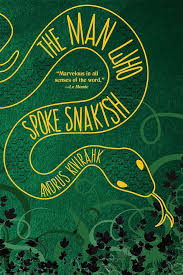
translated by Christopher Moseley
original publication (in Estonian): 2007
this edition (in English): Black Cat, 2015
442 pages
grab a copy here or through your local independent bookstore or library
First, I’d like to dwell on the fact that this is the first novel translated from the Estonian that I’ve ever read. For those of you who don’t follow me on twitter (@Rcordas), not many things excite me as much as getting my hands on a work of translation from an underrepresented language. For instance, I read two collections of Vietnamese fiction this year, which was very exciting. Reading SFT from these languages makes me feel like I’m slowly but surely expanding my understanding of the richness and variety of thought and art that makes this planet so fascinating.
But back to The Man Who Spoke Snakish. Set in the forests and villages of twelfth-century Estonia, just as Christianity was spreading throughout the country, Kivirähk’s novel focuses on the tragic life of a pagan named Leemet, who is destined to be the last of his kind. As Peter Blackstock, the editor of the translation, has said of the novel, “at its heart it is perhaps a Bildungsroman of a boy whose Bildung ends up being useless when the society around him changes so dramatically it leaves him completely behind. In this way, it’s a book about war, violence, and occupation, as well as magic and tradition. But although there is much in the novel that explores ideas about modernity and existential questions of change, the book surprises with its tone of lightheartedness, of humor.”
Though born in a village, Leemet moves back to the forest with his mother and sister after his father is killed by a bear (the bear was his mother’s lover). Happy to be back in the forest once more, Leemet’s mother returns her family to its ancient ways, which includes using Snakish to communicate with the snakes and animals. In this way, they can procure meat and stay safe from the encroaching “iron men” (knights) and missionaries, who sometimes venture into the forest. Sadly, though, more and more people are moving out of the forest and into the village, lured by modern technology, Christianity, and a general belief that village life is the future.
As the forest empties of people, Leemet and his family become increasingly isolated. Intrigued by the village but suspicious, as well, and disgusted by its foul-tasting bread and silly-looking farming contraptions, Leemet nonetheless befriends a young village girl, whom he will visit from time to time throughout his life. And yet, Leemet is firmly entrenched in the forest, learning Snakish from his uncle and befriending adders, a pair of primates, and other animals.
As he grows up, Leemet recognizes that the crazed sage of the forest who demands increasingly demented sacrifices to forest sprites is no different than the village elder who insists that everyone in the forest must move to the village and convert to Christianity. Leemet’s life becomes increasingly consumed by violence and tragedy as everyone he loves is killed because of fanaticism, hatred, and bloodlust. Left alone in the forest, the last person who knows Snakish and the ways of the forest, Leemet finally finds the mythical Frog of the North, and spends the last of his days with it.
Beautifully translated by Christopher Moseley, The Man Who Spoke Snakish pulls you in to its unexpected and fascinating story, even as the violence that characterizes its second half is difficult to read at times. Ultimately, I look forward to reading more Estonian fiction in the future.

1 comment on “Review: The Man Who Spoke Snakish by Andrus Kivirähk”